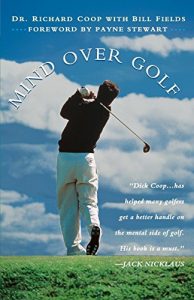 I started playing golf when I was in high school. For years, I believed the key to going low was having the perfect swing, mastering different shots, and practicing endlessly. I spent time at the driving range pounding balls just because, on the putting green batting balls around aimlessly, and even around the pitching green thinking it might help. I watched the golf channel and read Golf magazine to pick up tips to perfect my swing. On the course, I’d focus on keeping my head down, eye on the ball, left arm straight, and all that jazz. What did I have to show for my efforts?
I started playing golf when I was in high school. For years, I believed the key to going low was having the perfect swing, mastering different shots, and practicing endlessly. I spent time at the driving range pounding balls just because, on the putting green batting balls around aimlessly, and even around the pitching green thinking it might help. I watched the golf channel and read Golf magazine to pick up tips to perfect my swing. On the course, I’d focus on keeping my head down, eye on the ball, left arm straight, and all that jazz. What did I have to show for my efforts?
Nothing.
OK. Maybe that’s being a little dramatic. It probably helped some, but even after all that time and effort, I still struggled to consistently break 100. On a good day, I might break 90. I didn’t make major improvements in my game until I realized it wasn’t the physical part of the game that was holding me back. It was the mental side. As the great Arnold Palmer once said, “Golf is a game of inches. The most important are the six inches between your ears.”
So if this is indeed the case, and who am I to argue with Arnie, what does one do? Well, if you’re like me, you search out material (i.e. books) to help you study and learn how to control and improve your mental approach to the game. It’s one of the reasons why I decided to read Mind Over Golf by Dr. Richard Coop. The book was mentioned in Maxwell Maltz’s classic work Psycho-Cybernetics, which is a personal favorite of mine, as a great way to improve your mental approach to the game, as well as life in general. With a recommendation that strong, I had to add it to my reading list.
Now don’t get me wrong. A person new to the game of golf needs to spend time learning the physical parts of the golf swing. But once acquainted with the basics and able to make decent contact, time is better spent mastering the mental aspect than haphazardly banging balls at the range. Quite honestly, I don’t think people realize how much the mental aspect of the game holds them back. If time is spent mastering the mental part, the physical part will follow. For me, it was the single most important thing that allowed me to break 90 with consistency, and to occasionally break 80.
Of the golf books I’ve read, I’d put Mind Over Golf up near the top of the list. It’s right there with Timothy Gallwey’s Inner Game of Golf, which is another classic. Coop’s book will help you gain control of the six inches between your ears, tame the self-talk and inner chatter that goes on during the four-plus hours on the course, and improve your mental approach. And I also like that Coop spent a little time at the end of the book talking about what you can transfer from golf into life, of which there is plenty. Here are, as he puts it, “seven mental-health skills or strategies that can be learned directly from golf and transferred to your daily life”:
- Live in the present tense
- Develop a realistic locus of control – control those factors you can control, acknowledge those you cannot, and have the wisdom to know the difference
- Adapt your behavior to fit the current situation
- Develop self-analysis and self-understanding
- Develop the skill of cognitive reasoning
- Learn to accept yourself
- Develop the wisdom to value the basics
I especially love how he wraps up the book with why it’s important to value the basics:
Transferring this philosophy [valuing the basics] to life, the fundamental things like family, friends, and relationships built on integrity are what really matter. Whether on or off the course, the person with integrity is the winner.
Since Mind Over Golf is not entirely applicable to non-golfers, I’m not putting it into my Must Read category. However, it is a Must Read for anyone who plays the game or endeavors to do so. I would urge anyone who is considering taking up golf to read this book first, or early in your journey (along with Gallwey’s book). And above all, remember this other famous quote from the legendary Arnold Palmer. Tuck it away in the back of your mind. It will come in handy when you experience the ups and certain downs that occur during a round of golf:
Golf is deceptively simple and endlessly complicated; it satisfies the soul and frustrates the intellect. It is at the same time rewarding and maddening – and it is without a doubt the greatest game mankind has ever invented.
Well said Arnie. I couldn’t agree more.

Pingback: My 2018 reading list - Gregg Borodaty